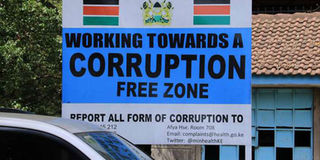Urgent reform is needed to bring public services closer to Kenyans

A sign board outside Afya House in Nairobi warns against corruption. Ifmis has been used to aid graft. PHOTO | JEFF ANGOTE | NATION MEDIA GROUP
What you need to know:
- In organised societies like Kenya, the relationship between the citizens and the government can best be described as a social contract, an implicit agreement defining and limiting the rights and duties of each party.
- In the old days of centralised governance, regions that supported the government enjoyed maendeleo while those who chose the opposition were generally marginalised.
One of the worst nightmares is having to visit a government office for crucial documents such as title deeds, police abstracts, identity cards, passports, birth certificates, or even business licences.
I recently visited a police station to obtain a police abstract after a matatu hit my car. The abstract was necessary to initiate the claim process with my insurer.
I was made to feel like a criminal and was subjected to two days of queuing, begging, rude officers, and being tossed to and fro. I left feeling frustrated and hoping that I would never need to visit a police station again.
There have been numerous surveys on citizens’ interactions with public service. Sadly, the report card is not very flattering to the government. Many citizens still complain of lack of essential services, inaccessibility, and poor attitude among the staff. They are disillusioned and have learnt to manage their expectations or explore alternatives.
Good and adequate service is not a privilege that the government decides to dish out whimsically to people based on their loyalty. Adequate water supply, good roads, garbage collection, health services, education, a clean environment, security — these are not the preserve of a few; they are a right that every citizen is entitled to.
A friend told me that his family was scheduled to host visitors on a Sunday afternoon. There had been no water for an entire week. When suddenly there was the sound of water running in the taps, his wife went into ululations, thanking God. The man was bemused that his wife was celebrating something that ordinarily should be her right.
In organised societies like Kenya, the relationship between the citizens and the government can best be described as a social contract, an implicit agreement defining and limiting the rights and duties of each party. For the relationship to work, both the governed and the government need to be aware of their expectations and obligations.
In this relationship, citizens expect the government to provide certain basic services such as education, health, water, security, and good infrastructure. On the other hand, the government should legitimately expect the citizens to dutifully pay taxes and support it.
Sadly, the provision of these basic services has been turned into a campaign tool, a carrot dangled only to woo people to support the government. It becomes a privilege only a few people can enjoy in exchange for their vote or political support. As a result, the services are inaccessible to many people, especially the poor and powerless who rely on the government for their most basic needs.
In the old days of centralised governance, regions that supported the government enjoyed maendeleo while those who chose the opposition were generally marginalised. The current Constitution guarantees equitable distribution of resources irrespective of political affiliation and key government services have been devolved to the counties.
Citizens must learn to expect and demand quality and efficient public service, both at the national and county levels. They must insist on being served promptly in public offices and remind any lazy or rude officers that their primary role is to serve them and that their jobs and offices are maintained by their tax money.
The introduction of Huduma Centres has improved public service. It has also exposed the great hunger and demand for easily accessible government services. The reforms must translate the expectations of Kenyans into meaningful results by helping to bring services closer to the people.
The reforms must also include attitude change among civil servants. They must tackle the entrenched vices of corruption and inefficiency as citizens become empowered to demand better services. Kenyans should reasonably expect every civil servant to provide public service efficiently and professionally without demanding or expecting a bribe.
Dr Kamau is a lecturer at the Graduate School of Media and Communications, Aga Khan University. [email protected].




